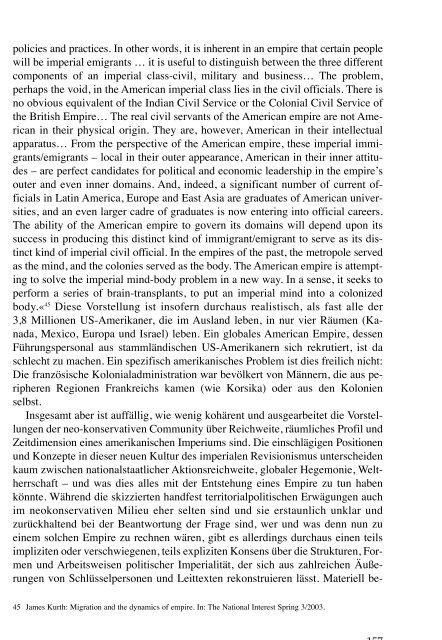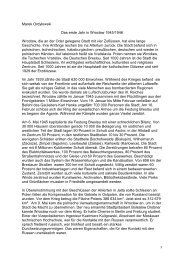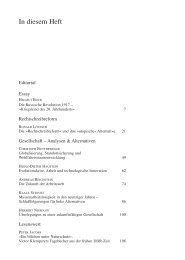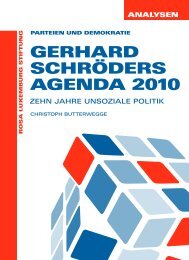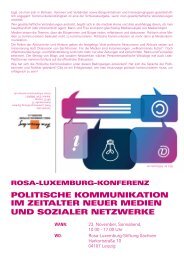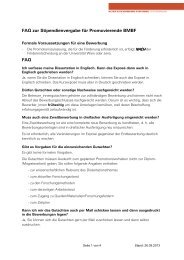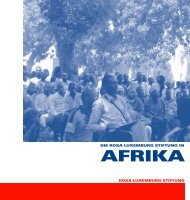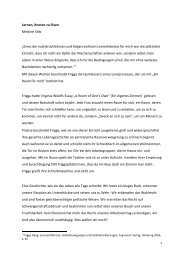Schöne neue Demokratie - Rosa-Luxemburg-Stiftung
Schöne neue Demokratie - Rosa-Luxemburg-Stiftung
Schöne neue Demokratie - Rosa-Luxemburg-Stiftung
Sie wollen auch ein ePaper? Erhöhen Sie die Reichweite Ihrer Titel.
YUMPU macht aus Druck-PDFs automatisch weboptimierte ePaper, die Google liebt.
policies and practices. In other words, it is inherent in an empire that certain people<br />
will be imperial emigrants … it is useful to distinguish between the three different<br />
components of an imperial class-civil, military and business… The problem,<br />
perhaps the void, in the American imperial class lies in the civil officials. There is<br />
no obvious equivalent of the Indian Civil Service or the Colonial Civil Service of<br />
the British Empire… The real civil servants of the American empire are not American<br />
in their physical origin. They are, however, American in their intellectual<br />
apparatus… From the perspective of the American empire, these imperial immigrants/emigrants<br />
– local in their outer appearance, American in their inner attitudes<br />
– are perfect candidates for political and economic leadership in the empire’s<br />
outer and even inner domains. And, indeed, a significant number of current officials<br />
in Latin America, Europe and East Asia are graduates of American universities,<br />
and an even larger cadre of graduates is now entering into official careers.<br />
The ability of the American empire to govern its domains will depend upon its<br />
success in producing this distinct kind of immigrant/emigrant to serve as its distinct<br />
kind of imperial civil official. In the empires of the past, the metropole served<br />
as the mind, and the colonies served as the body. The American empire is attempting<br />
to solve the imperial mind-body problem in a new way. In a sense, it seeks to<br />
perform a series of brain-transplants, to put an imperial mind into a colonized<br />
body.« 45 Diese Vorstellung ist insofern durchaus realistisch, als fast alle der<br />
3,8 Millionen US-Amerikaner, die im Ausland leben, in nur vier Räumen (Kanada,<br />
Mexico, Europa und Israel) leben. Ein globales American Empire, dessen<br />
Führungspersonal aus stammländischen US-Amerikanern sich rekrutiert, ist da<br />
schlecht zu machen. Ein spezifisch amerikanisches Problem ist dies freilich nicht:<br />
Die französische Kolonialadministration war bevölkert von Männern, die aus peripheren<br />
Regionen Frankreichs kamen (wie Korsika) oder aus den Kolonien<br />
selbst.<br />
Insgesamt aber ist auffällig, wie wenig kohärent und ausgearbeitet die Vorstellungen<br />
der neo-konservativen Community über Reichweite, räumliches Profil und<br />
Zeitdimension eines amerikanischen Imperiums sind. Die einschlägigen Positionen<br />
und Konzepte in dieser <strong>neue</strong>n Kultur des imperialen Revisionismus unterscheiden<br />
kaum zwischen nationalstaatlicher Aktionsreichweite, globaler Hegemonie, Weltherrschaft<br />
– und was dies alles mit der Entstehung eines Empire zu tun haben<br />
könnte. Während die skizzierten handfest territorialpolitischen Erwägungen auch<br />
im neokonservativen Milieu eher selten sind und sie erstaunlich unklar und<br />
zurückhaltend bei der Beantwortung der Frage sind, wer und was denn nun zu<br />
einem solchen Empire zu rechnen wären, gibt es allerdings durchaus einen teils<br />
impliziten oder verschwiegenen, teils expliziten Konsens über die Strukturen, Formen<br />
und Arbeitsweisen politischer Imperialität, der sich aus zahlreichen Äußerungen<br />
von Schlüsselpersonen und Leittexten rekonstruieren lässt. Materiell be-<br />
45 James Kurth: Migration and the dynamics of empire. In: The National Interest Spring 3/2003.<br />
157


